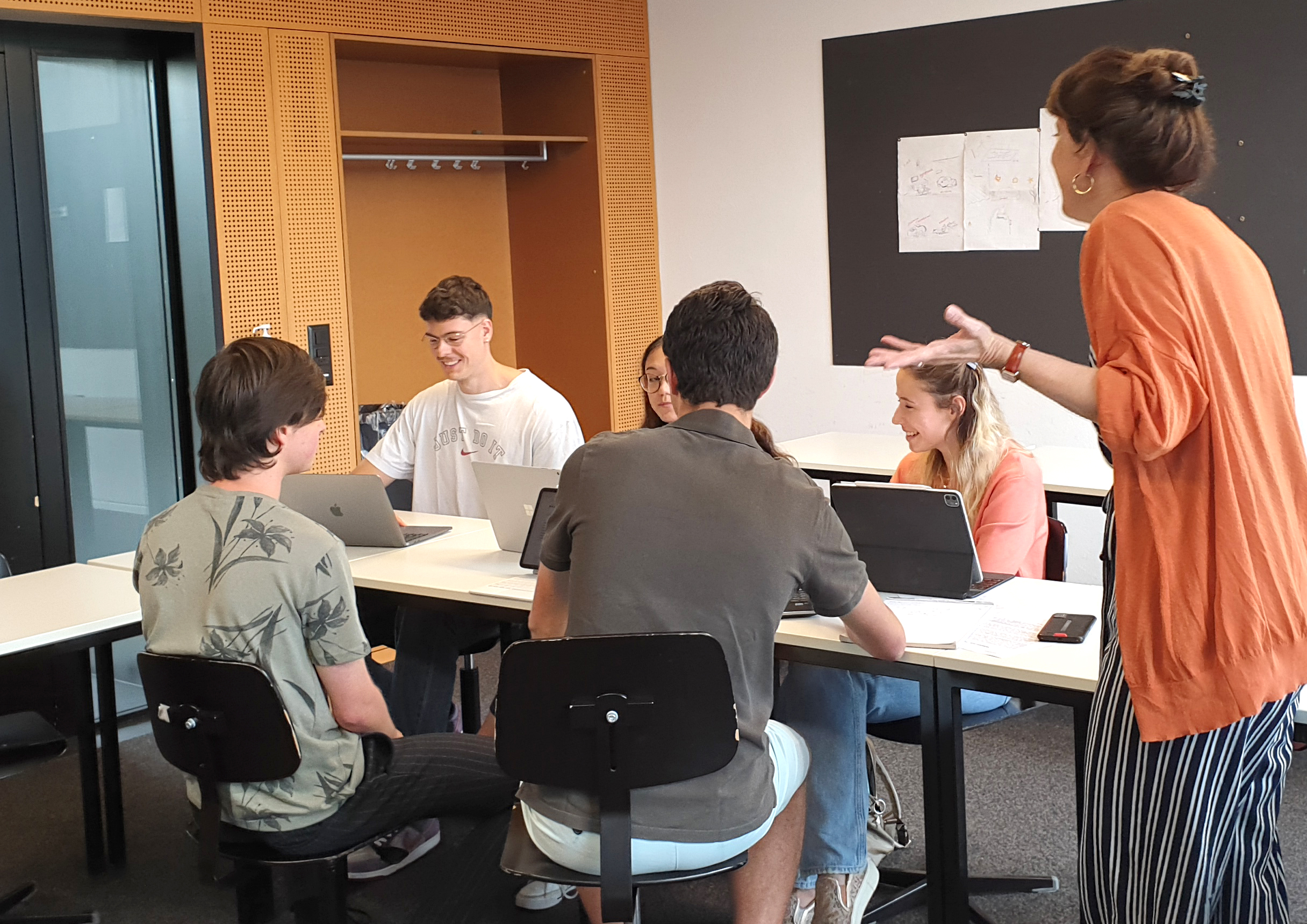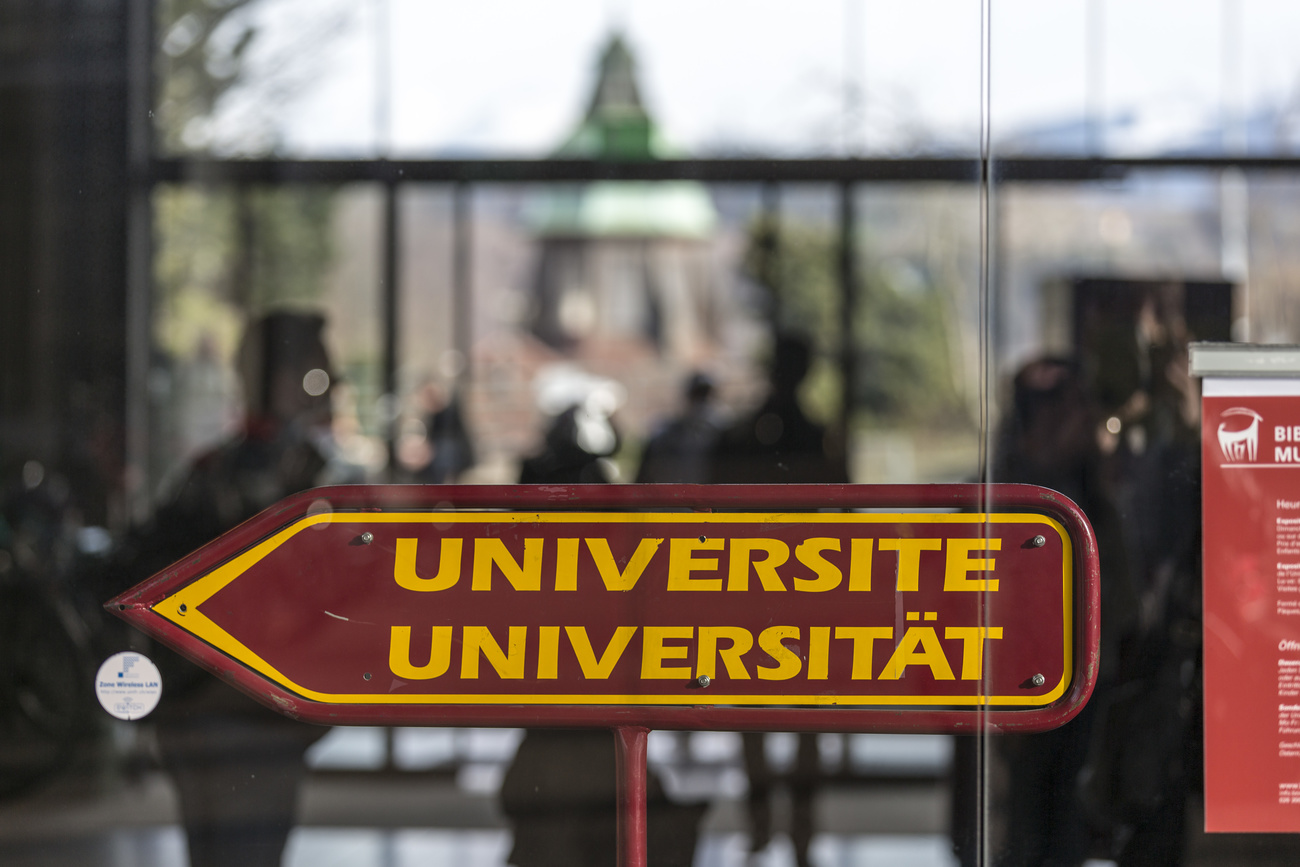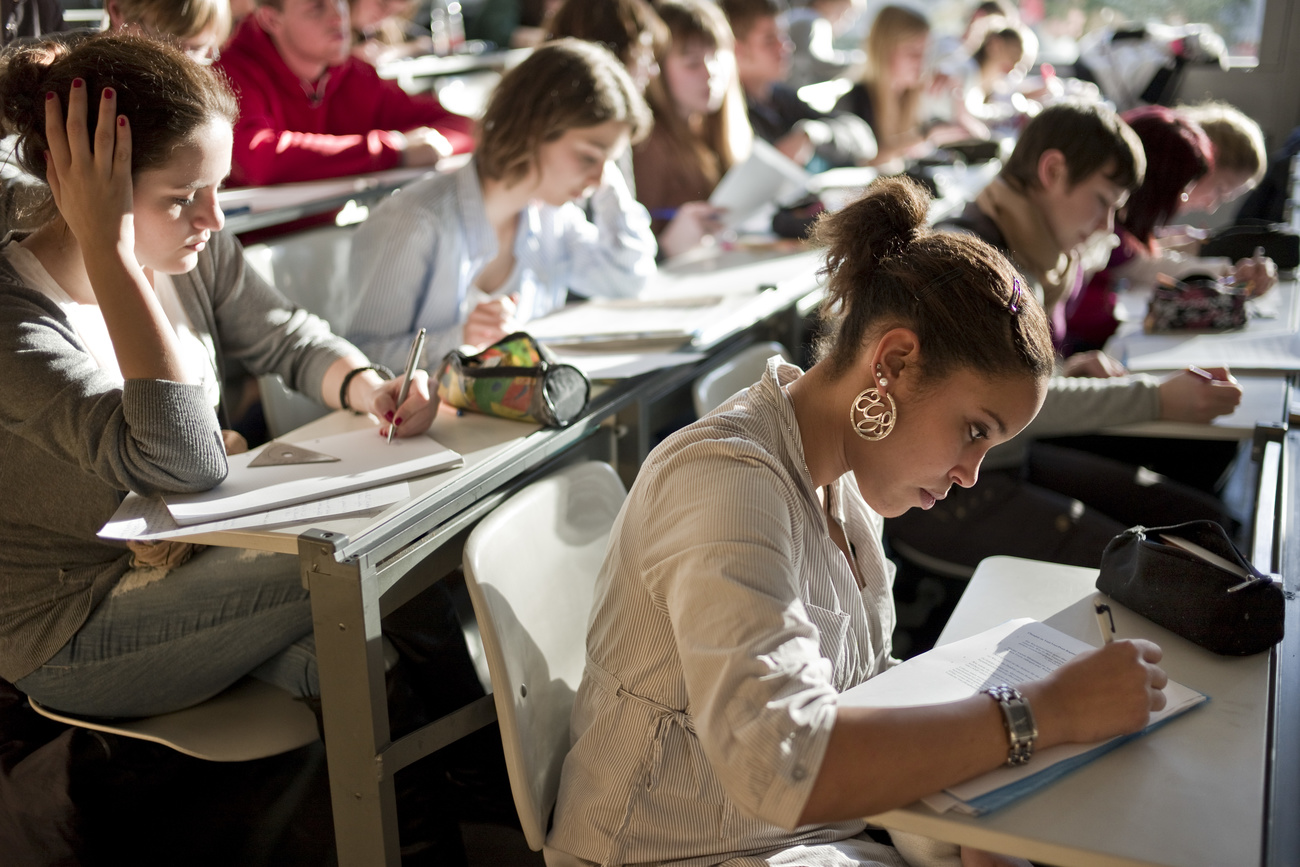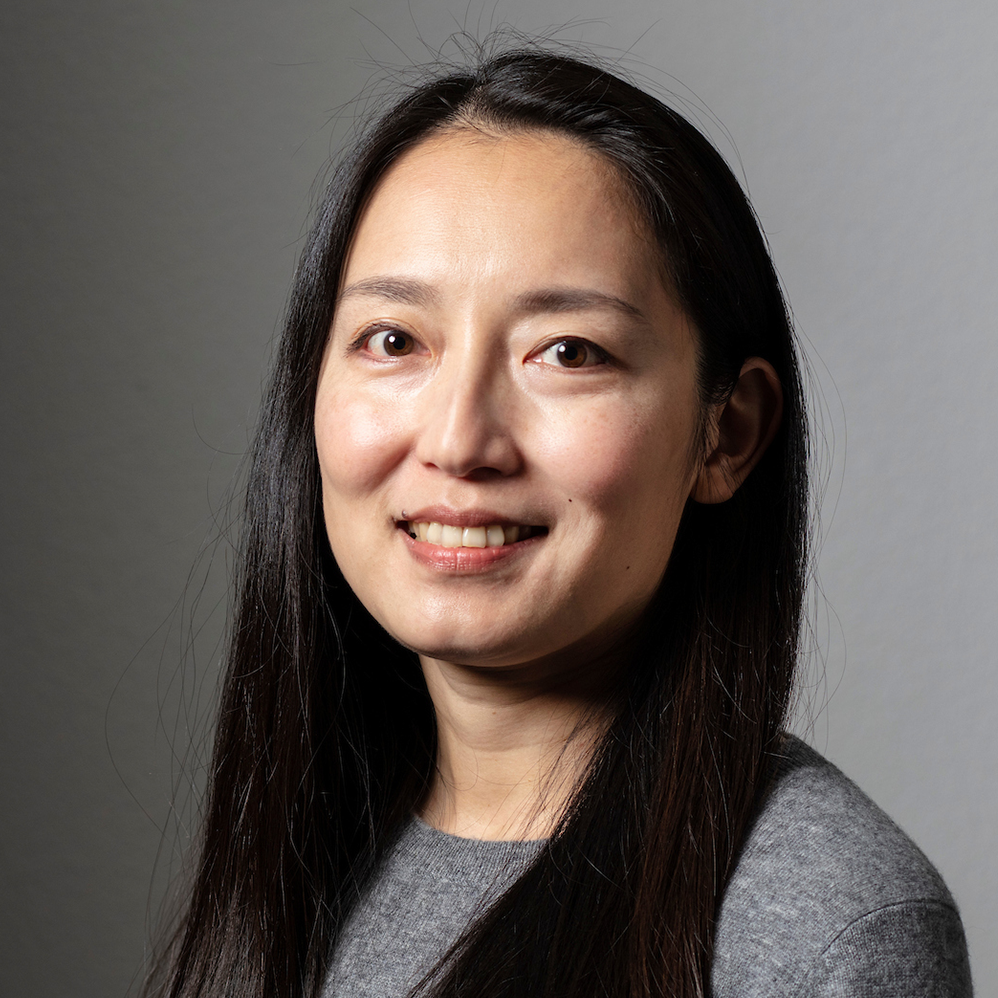Bilingual students have the upper hand

The University of Fribourg is one of the few bilingual French-German universities in the world, and the only one of its kind in Switzerland. Studying in two languages is not always straightforward, however – even if it boosts students’ career prospects.
For Katia Dubey, choosing the University of Fribourg to study history came down to one factor: languages.
“Coming as I do from Switzerland, and in particular from the canton of Fribourg, being able to speak both French and German was only natural for me,” says Dubey, who has just completed a master’s programme at the only university in the country that gave her the option of a bilingual degree.
Bilingualism is intrinsic to the canton of Fribourg, which straddles the country’s linguistic border. The medieval city of Fribourg was founded as a bilingual city in 1157. Since then, it has been a meeting point of French- and German-speaking cultures. Its multicultural identity is constantly evolving, both in the city and at the university.
The university itself was founded in 1889 under German influence. Many of the professors were then recruited from Germany. In 2006, some 50% of students were studying in German and 30% in French. By 2021, the proportion had inverted: the university now has 32% German-speaking students and 46% French-speaking students. Two percent of them are fluent in both languages.
Of the university’s approximately 10,000 students, some 80% are Swiss and 12% come from elsewhere in Europe. The rest hail from Asia, America and Africa. The Faculty of Science and Medicine is the most international, with 20% foreign students.
Not all students opt for bilingual courses, which are, in fact, only chosen by a minority. To earn a bilingual degree, students must obtain at least 40% of their credits in each of the two languages. This is a challenge for some, especially international students, many of whom speak neither French nor German.

A demanding curriculum
Almost all disciplines offer courses in German, French or both, but this does not mean that all classes are held in both languages. They must also remain accessible to those who have not chosen bilingual studies. In practice, though, the two languages are often mixed.
Thus professors will sometimes ask a question in German in a class taught in French. Students may also attend lectures in one language but sit their exams in the other. The course materials and the lectures may be in different languages.
Katia is a native French-speaker, but she chose German as the main language for her bachelor’s degree and French for her master’s.
“You have to be really well-organised to combine studies in both languages,” she says. “And sometimes you can’t take a class that interests you, because it’s not in the right language”.
English is not an official language at the University of Fribourg, but it is recognised as a working language. It is used where necessary for administrative purposes and in some teaching.
Natural science classes at master’s level already take place mainly in English, and English is also important in other subjects, especially economics.
Some academics see this as a threat to the role of French and German as scientific languages, while others take a more pragmatic view. For some young researchers, for example, English is essential to building their careers and publishing in high-profile journals.
“The first few weeks required a huge mental effort – I didn’t feel comfortable speaking in front of a class of native speakers, but I got used to it soon enough,” says Luca Panarese, an Italian-born student currently enrolled in a bilingual master’s in modern history. “Before handing in a paper, I would always ask someone to proofread and correct it [for me].”
Better career prospects
These efforts are often rewarded. Companies value bilingual degrees. Carmen Delgado Luchner, who runs the university’s language centre, advises students who are applying for jobs to highlight the fact that they have taken classes in both languages, even if they did not obtain a bilingual qualification.
“In Switzerland, people who are bilingual earn higher salaries on average,” she says.
This is demonstrated by a report on the value of languages at the workplace written by François Grin, a professor of the economics of languages at the University of Geneva, in 2015. According to this report, men in German-speaking Switzerland and in the Italian-speaking canton of Ticino who speak fluent French in addition to their native language earn 14.1% and 17.2% more, respectively, than their non-French speaking counterparts. Similarly, in French-speaking Switzerland and Ticino, men with a good level of German earn 13.8% and 16.9% more than their non-German speaking colleagues.
Katia, the history student, opted for bilingual studies in large part because of the career prospects they offer. She wants to be a secondary school teacher.

More
Vocational training drives tertiary qualification rise in Switzerland
“My bilingual degree gives me an edge if I stay in the city of Fribourg, where the secondary schools are bilingual,” she says. “It also opens doors for me elsewhere in Switzerland, as with it I can easily work anywhere in the French- or German-speaking parts of the country.”
“I won’t be tied down to one single linguistic region,” she adds. “This is a huge advantage, both professionally and personally.”
Luca, on the other hand, is hoping to find a job either in an NGO or in a European Union or Swiss government agency. Whichever path he takes, his multilingual skills will be an asset. In Switzerland, knowing at least two national languages is a pre-condition for working in the federal administration.
Bilingual, intercultural, interdisciplinary
The advantages are not just linguistic. Bilingual students also have an easier time integrating in other parts of Switzerland and in neighbouring countries.
“It’s interesting to see how different languages change your perspective,” says Luca. “For example, a history class held in French will tend to refer to the history of France, whereas one held in German will lean on the history of the German-speaking countries. So I’ve really learned a lot about both linguistic areas.”
Bilingualism is also promoted among law students through the Bilingual Plus programme. The university’s law faculty and language centre organise language classes and bilingual workshops to help students learn the terminology and related work culture in the target language. During an annual Law in Cinema event, German- and French-speaking students work on film scenes that are relevant to their law studies.

More
English as a common language in Switzerland: a positive or a problem?
“In Switzerland, the work culture is different depending on the language region,” says Bilingual Plus programme manager, Alessandra Keller-Gerber. “This is why the cultural aspects are also central to our teaching.”
This interculturality is complemented by interdisciplinarity and, since September, students from other disciplines are also invited to take part in the workshops.
“Depending on the topic, it made sense that students from other fields should also benefit by doing the same work from a sociology, political science or literature point of view,” says Keller-Gerber.
“The origins of bilingual universities are frequently political,” write the authors of a report on higher education in Europe published by UNESCO in 2000. “Their missions are closely linked to their specific situations and to the needs of their regions.”
Internationally, the University of Ottawa in Canada is recognised as the largest bilingual (French-English) university in the world. The country boasts several universities – mainly in the province of Quebec – that offer teaching in the two official languages, including the University of Quebec, Polytechnique Montréal and Concordia University.
European bilingual universities are mainly found in bilingual or multilingual countries such as Switzerland, Luxembourg, Belgium, Finland and Norway. The University of Luxembourg offers instruction in French, English and German. Established in 2003, it offers 11 bachelor’s and 23 master’s degrees spread across three faculties. In the Netherlands, Maastricht University offers courses taught in Dutch and English.
Tertiary education in the former Soviet republics differs from one country to the next. In Kyrgyzstan, university teaching is mainly conducted in Russian, Kyrgyz, English and Turkish. Universities in Turkmenistan now function only in Turkmen; the influence of Russian in academia has waned considerably in this country since the early 2000s.
Edited by Virginie Mangin. Translated from French by Julia Bassam.

More
How easy is it for foreign students to study in Swiss universities?

In compliance with the JTI standards
More: SWI swissinfo.ch certified by the Journalism Trust Initiative













You can find an overview of ongoing debates with our journalists here . Please join us!
If you want to start a conversation about a topic raised in this article or want to report factual errors, email us at english@swissinfo.ch.